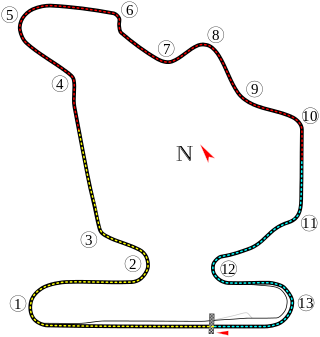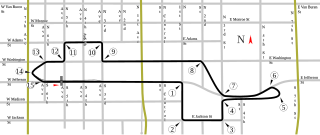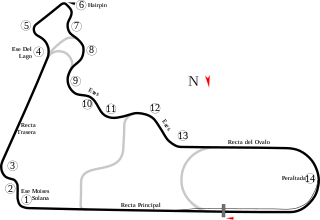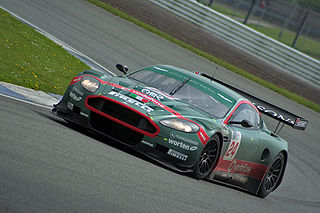
Andrea de Cesaris was an Italian racing driver. He started 208 Formula One Grands Prix but never won. As a result, he holds the record for the most races started without a race victory. A string of accidents early in his career earned him a reputation for being a fast but wild driver.

The 1989 Monaco Grand Prix was a Formula One motor race held at the Circuit de Monaco, Monte Carlo on 7 May 1989. It was the third race of the 1989 Formula One World Championship. The 77-lap race was won from pole position by Ayrton Senna, driving a McLaren-Honda, with teammate Alain Prost second and Stefano Modena third in a Brabham-Judd.

The 1989 United States Grand Prix was a Formula One motor race held in Phoenix, Arizona on June 4, 1989. It was the fifth race of the 1989 Formula One World Championship and the first United States Grand Prix to be held in Phoenix.
The 1989 Canadian Grand Prix was a Formula One motor race held at Circuit Gilles Villeneuve on 18 June 1989. It was the sixth race of the 1989 Formula One World Championship.

The 1989 French Grand Prix was a Formula One motor race held at Paul Ricard on 9 July 1989. It was the seventh race of the 1989 Formula One World Championship.

The 1990 Hungarian Grand Prix was a Formula One motor race held at Hungaroring on 12 August 1990. It was the tenth race of the 1990 Formula One World Championship. The race was the sixth Hungarian Grand Prix and the fifth to be held at the Hungaroring. It was held over 77 laps of the 3.97-kilometre (2.47 mi) circuit for a race distance of 305.5 kilometres (189.8 mi).

The 1991 United States Grand Prix was a Formula One motor race held on March 10, 1991 in Phoenix, Arizona. It was the first race of the 1991 Formula One World Championship. The 81-lap race was won from pole position by Ayrton Senna, driving a McLaren-Honda, with Alain Prost second in a Ferrari and Nelson Piquet third in a Benetton-Ford.

The 1991 Monaco Grand Prix was a Formula One motor race held at Monaco on 12 May 1991. It was the fourth race of the 1991 Formula One World Championship.
The 1991 Canadian Grand Prix was a Formula One motor race held at Circuit Gilles Villeneuve on 2 June 1991. It was the fifth race of the 1991 FIA Formula One World Championship.

The 1991 Mexican Grand Prix was a Formula One motor race held at the Autódromo Hermanos Rodríguez, Mexico City, on 16 June 1991. It was the sixth race of the 1991 Formula One World Championship.

The 1991 British Grand Prix was a Formula One motor race held at Silverstone on 14 July 1991. It was the eighth race of the 1991 FIA Formula One World Championship.

The 1991 German Grand Prix was a Formula One motor race held at the Hockenheimring on 28 July 1991. It was the ninth race of the 1991 Formula One World Championship, and the first German Grand Prix to be held in Germany after the reunification between West and East Germany.

The 1989 FIA Formula One World Championship was the 43rd season of FIA Formula One motor racing. It began on 26 March and ended on 5 November. Alain Prost won his third Drivers' Championship, and McLaren won the Constructors' Championship.

Alessandro Giuseppe "Alex" Caffi is an Italian racing driver, former Formula One driver, and team owner. He participated in 75 Grands Prix, debuting on 7 September 1986. In 2006 he raced in the inaugural season of the Grand Prix Masters formula for retired Formula One drivers. He currently serves as the team owner of NASCAR Whelen Euro Series team Alex Caffi Motorsport, occasionally doing owner-driver duties as well.

BMS Scuderia Italia SpA is an Italian auto racing team founded by Italian steel magnate and motorsports enthusiast Giuseppe Lucchini in 1983. Initially named Brixia Motor Sport (BMS) the team briefly entered the World Touring Car Championship, the team's name was altered to BMS Scuderia Italia upon their entrance into Formula One in 1988. After departing Formula One in 1993, BMS Scuderia Italia has been involved in touring car racing and sports car racing.

The Dallara 3087 is a Formula 3000 car, first used in the 1987 International Formula 3000 season, with which the BMS Scuderia Italia team competed in the first race of the 1988 Formula One season. Driven by Alex Caffi, it failed to pass pre-qualifying with its fastest time being 18 seconds slower than the time set by Ayrton Senna for pole position. The BMS Scuderia Italia team replaced the car for the next race with Dallara F188 which was specifically designed for Formula One.

The Dallara F192 was a Formula One car designed by Giampaolo Dallara, of Dallara, and used by the BMS Scuderia Italia team during the 1992 Formula One season. The car was powered by the Ferrari V12 engine and ran on Goodyear tyres.

The Dallara F191 was a Formula One car designed by Giampaolo Dallara and Nigel Cowperthwaite for use by the BMS Scuderia Italia team during the 1991 Formula One season. Its best finish was at the San Marino Grand Prix when JJ Lehto drove it to third place.

The Dallara F190 was a Formula One car designed by Giampaolo Dallara and Christian Vanderpleyn for use by the BMS Scuderia Italia team during the 1990 Formula One season. It was powered by the 3.5L Cosworth DFR engine. It failed to score any points for the team.
The Dallara F188 was a Formula One car designed by Giampaolo Dallara and Sergio Rinland for use by the BMS Scuderia Italia team during the 1988 Formula One season. Driven by Italian Alex Caffi, it failed to score any points for the team.
















